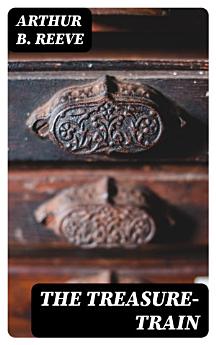The Treasure-Train
Arthur B. Reeve
Jul 2022 · DigiCat
Ebook
213
Pages
family_home
Eligible
info
reportRatings and reviews aren’t verified Learn More
About this ebook
Arthur B. Reeve's 'The Treasure-Train' is a compelling amalgamation of scientific intrigue and detective fiction that brilliantly showcases the intellectual odyssey of Professor Craig Kennedy and his confidant, Walter Jameson. Straddling the realm of pulp magazines and the nuanced tradition of detective narrative, the collection is imbued with a rich tapestry of thematic elements – from the tantalizing promise of undiscovered knowledge to the dark underbelly of human greed. Reeve's prose crackles with the electricity of early twentieth-century scientific discoveries and is steeped in the stylistic flourishes of the era's literary context, marking a significant contributory note to America's answer to the British-dominated detective genre. Arthur B. Reeve, an American mystery writer of notable recognition, was marked by his times and intellectual endeavors in crafting this paragon of detective fiction. His creation, Professor Kennedy, dubbed as 'The American Sherlock Holmes,' reflected the nation's burgeoning fascination with science and technology and can be seen as a manifestation of the zeitgeist of an era where scientific advancements began to permeate the popular consciousness. Reeve's professional engagement with the period's scientific milieu and his journalistic acumen infused his work with authenticity and an investigative sharpness that appealed to a readership hungry for cerebral and sensational fiction. 'The Treasure-Train' is recommended not only for fans of classic whodunits but also for those who revel in the intersection of science and suspense. Its place in the canon of early American mystery literature is cemented by Reeve's inventive narratives and the indelible impression of his uniquely rational and methodical sleuth. Reverberating with the thrum of the industrial age's wonders and the clever twists of a master story-weaver, Reeve's work remains an essential read for those captivated by the golden age of detective stories and the luster of forensic science's nascent allure.
About the author
Arthur B. Reeve (1880–1936) was an American author best known for his contributions to the detective fiction genre. Reeve's literary career intersected with the golden age of detective stories, and he is esteemed for creating the character of scientific detective Craig Kennedy, sometimes referred to as the 'American Sherlock Holmes.' His narratives often incorporated elements of science and technology, a reflection of the era's fascination with innovation and the burgeoning field of forensic science. 'The Treasure-Train' is one example of Reeve's mastery in weaving mystery with the intricacies of scientific detection. In addition to this title, Reeve authored a prolific series featuring Kennedy, which began with 'The Silent Bullet' (1910) and continued for over two decades. Reeve's detective stories, rife with suspense and intrigue, were serialized in popular magazines before being compiled into book form, effectively reaching a wide audience and establishing his reputation as a leading figure in his genre. Elevated by intricate plots and the use of cutting-edge science, Arthur B. Reeve's work remains a notable part of the early 20th-century American literary landscape.
Rate this ebook
Tell us what you think.
Reading information
Smartphones and tablets
Install the Google Play Books app for Android and iPad/iPhone. It syncs automatically with your account and allows you to read online or offline wherever you are.
Laptops and computers
You can listen to audiobooks purchased on Google Play using your computer's web browser.
eReaders and other devices
To read on e-ink devices like Kobo eReaders, you'll need to download a file and transfer it to your device. Follow the detailed Help Center instructions to transfer the files to supported eReaders.








